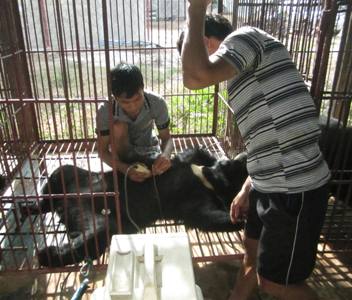By David Garshelis, co-chair of the IUCN Bear Specialist Group and Lorraine Scotson.
Demand for bear bile, an important component of traditional medicine in Eastern Asia, has led to the over-exploitation and decline of many Asian bear populations, especially Asiatic Black Bears. Bear farming was conceived as a method to increase supply of bile and thereby reduce the motivation to poach wild bears; however, there is no evidence that farming has helped bear conservation and there’s concern by conservationists that it may be detrimental.
At the recent IUCN World Conservation Congress, a resolution was adopted that pushes for closing bear farms that are stocked with wild bears.
Some farms in China apparently have self-perpetuating captive populations; nevertheless, it is not clear how the burgeoning bear farming industry, with new products and advertising, is affecting demand for wild bile. The resolution ‘Bear farming in Asia with particular reference to the conservation of wild populations’ calls for a thorough, independent analysis of how farming is affecting the market for wild bears.
If this investigation uncovers negative, market-driven effects of bear farming on wild bears, it will likely prompt a push to end farming altogether. Dealing with the thousands of bears currently on farms, and replacing bile with an acceptable synthetic substitute represent major obstacles to ending bear farming. In preparation for the future, this resolution calls for no further increase in the farmed bear population, and heightened research and promotion of alternatives to bear bile as a medicine.
On another note, the travelling ambassador for bear conservation is having a busy time…
Mi Ton Teiow — his name translated to English as “the travelling bear” — was crafted in a small Akha village near Luang Prahbang in Lao PDR. The Akha are a unique ethnic tribe known for their wild imaginations and creative workmanship. Mi, a ‘teddy bear’ with a mix-match of woven colours, symbolizes the range of international biologists who will take him on travels to encourage research and conservation of bears around the globe.
Mi entered the bear conservation world in July 2011 when he was bought at an auction in support of students at the International Conference for Bear Research and Management, in Canada. This sparked the idea to take him on a global journey to visit conservation-related studies, projects, and events involving all of the world’s bear species in a diversity of settings. Mi began his travels in northern Minnesota, where he had the opportunity to visit hibernating bears in their dens. He also attended the IUCN Congress and took a particular interest in the bear farming resolution given that bear farming has been growing in his home country, even though it is illegal because it involves removing bears from the wild and selling their bile.


